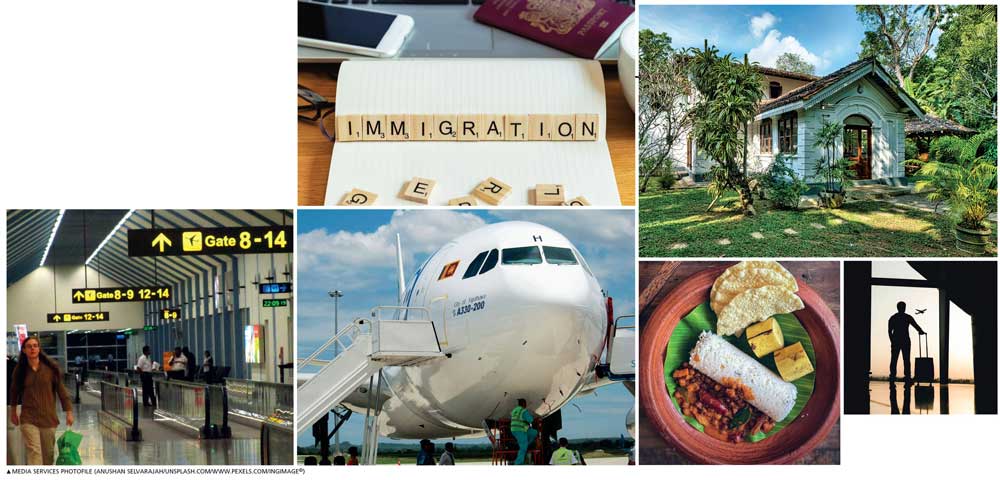NAVIGATING THE EXPAT LIFE
Questions to ask yourself
BY Monita Pesumal

What if you’ve recently received an amazing job opportunity overseas, been blessed with a migration visa or married someone who lives overseas? As someone who’s navigated expat life, here are some tips on what you need to consider before making the emotional decision to leave Sri Lanka for the longer term.
Will you embrace the culture shock?
The thrill and excitement at the prospect of moving abroad, coupled with the countless opportunities for personal and professional growth… will they compensate for the culture shock, which is a natural part of the expat experience?
Ask yourself if you can cope with a learning curve as you may have to adapt to life in a new city or work in an environment outside your comfort zone.
How will you handle being the newbie at work? No more familiar faces or spaces to guide you…
And will you be able to embrace the challenges as lessons? Or will you miss the comforts of home including the familiar cuisine, comforting smiles of family and friends, and not having to deal with being a ‘second-class citizen’ in a foreign land?
Culture shock can manifest in multiple ways from homesickness to feelings of isolation and anxiety. Before you embark on your expat journey therefore, invest time in researching the culture, customs and social etiquettes of your chosen destination.
Understanding and respecting the customs, traditions and values of the new country you’ve chosen is crucial for building relationships and integrating into society.
By staying open-minded or maintaining a connection with a close circle of fellow expats who can relate to your experiences, you can navigate the transition. A close circle of friends or confidantes can offer advice while sharing their own challenges.
It’s also comforting to maintain little reminders of home…
Cook your favourite dishes, listen to baila music if you have to, and stay connected with family and friends on Facebook to avoid feeling overwhelmed. Create a sense of balance, instead.
Can you make ends meet?
Leaving Sri Lanka for good often comes with a set of financial considerations that you may not have thought about previously. It’s vital to have a structured financial plan to ensure a smooth transition.
Consider factors such as the cost of living in your new destination. Understanding housing, groceries, transportation and daily expenses will help you budget more effectively.
Assess the healthcare system in your new country. Will you need to purchase health insurance, for instance?
If you have children, you’ll need to consider school fees, being mindful that while public schools are mostly free, private schools are always the safer option in any new city – at least until the kids get used to it.
And consider the exchange rate… Will you have a nest egg to survive for a couple of months such as if you’re migrating and yet to secure employment?
Rent will probably be one of your major expenses. Are you confident that you can cover it for the first couple of months?
It is also important to be disciplined and resist the temptation of excessive spending. The buzz of new shopping opportunities, dining experiences and exploring are bound to be strong.
Prioritise your needs over wants – especially during the initial stages of settling down. Keep a close eye on your budget and adjust as necessary to ensure your long-term financial security.
That’s why having a solid financial safety net will grant you peace of mind and enable you to focus on building a new life without undue stress.
Will you be able to adjust?
‘I know a friend who knows a friend.’ This familiar phrase may not always fly in the big bad world.
In Sri Lanka, a network of connections and sense of camaraderie can open doors, and facilitate solutions to just about every challenge. While your extensive network of ‘machang connections’ may not have the same influence on foreign soil, there’s an opportunity to cultivate new relationships and build a fresh support system.
So be prepared to stand in queues, wait your turn and abide by the system! Respect for personal space and patience, and an understanding of orderly processes, are essential.
Different countries have different rules, regulations and community norms that may not align with what you’re accustomed to in Sri Lanka. To thrive, you may need to adapt to these systems, whether they relate to government services, transportation or even social expectations.
Depending on your destination, language proficiency can be a key aspect of adjustment. Being able to communicate effectively in the local language will undoubtedly help you go the extra mile.
Embrace the differences you encounter, and view them as opportunities for personal growth and enrichment. With the right mindset, a willingness to adapt, and a respectful approach to your host country’s norms and systems, you can navigate change successfully.
And now for that the million dollar question…
Do you still really want to leave?
